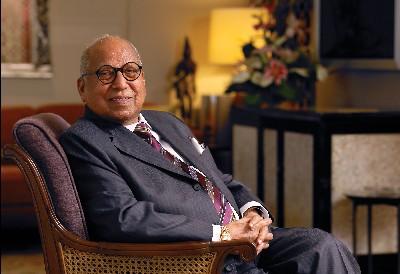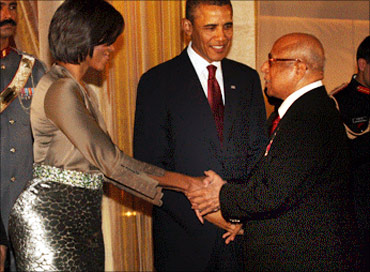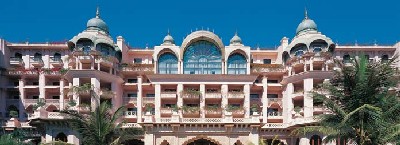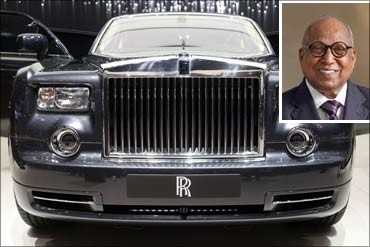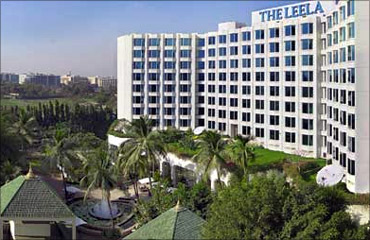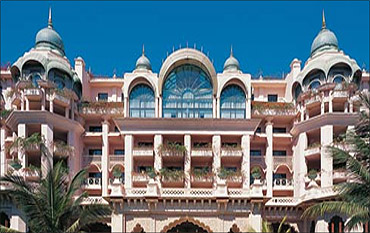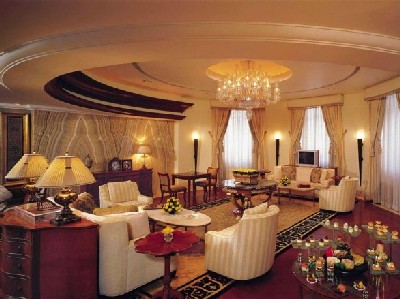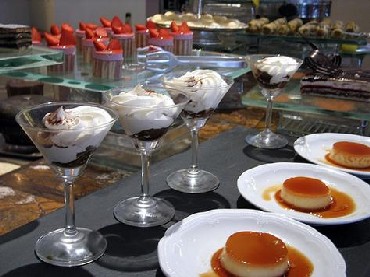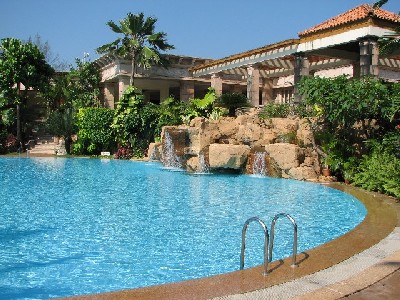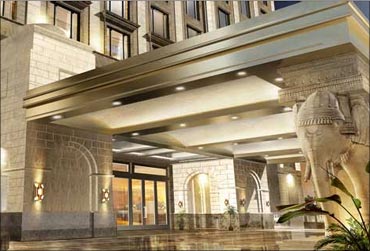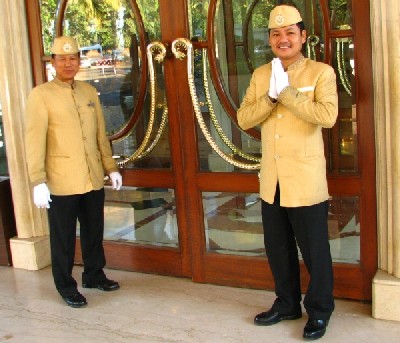 | « Back to article | Print this article |
Capt Nair, Leela Group's boss, shares his success story
Capt C P Krishnan Nair will turn 90 in February, but there isn't a wrinkle on his face. He was up till midnight at an awards function, yet there is no sign of fatigue. He sits at a corner table in the coffee shop of his hotel in New Delhi, the Leela Kempinski Palace.
He is dressed in a brown suit and a white shirt with its collar open. There's a small gold medal on the lapel -- the Global 500 Laureate Roll of Honour from the United Nations Environment Programme.
The wristwatch is cut from a single piece of lapis by a watchmaker called H Stern in Rio de Janeiro. He sips intermittently from a tall glass of jeera pani. "It cleanses the system," he says.
You cannot take lightly health tips from such a fit and energetic old man. He plays volleyball in the morning, followed by a walk from his home in Mumbai to his hotel next door, The Leela, to decorate an emerald Buddha with flowers and do some stretching at the gym.
Click NEXT to read more...
Capt Nair, Leela Group's boss shares his success story
After a massage, shower and breakfast, he works till at least 6 pm. It was perhaps good health that made him get into hotels when he was 65. Twenty-five years on, there is some admiration for what he has done and some disdain.
Analysts fret over the debt overhang of Rs 4,000 crore (Rs 40 billion). He has thus done a course correction and adopted an "asset-light" strategy. A New Delhi hotelier says Nair's Hotel Leelaventure ought to have grown bigger than the seven properties it currently runs -- it should have had at least 20 by now.
But Ashok Khanna, managing director of IHHR Hospitality and the man behind Ananda in the Himalayas in Uttarakhand, admires Nair because he built a chain without any formal training in the subject.
"He is passionate about his business," says Khanna. "Normally, hoteliers are born with a passion. It is difficult to develop it otherwise."
Click NEXT to read more...
Capt Nair, Leela Group's boss, shares his success story
If Nair has worries, they don't show up in his demeanour. He is in the mood to talk about his early days. Born to a family of modest means in northern Kerala, he was able to complete his studies because an impromptu poem he composed in school in honour of the ruler of Chirakkal so impressed the king that he gave him a lifetime scholarship.
In 1942, Nair was commissioned in the army as a wireless officer at Abbottabad. Five years later, he joined the Maratha Light Infantry.
As he winds through the action against the Razakars in Hyderabad (the fanatic soldiers of the Nizam who had refused to join India) right after Independence, an Arab gentleman walks up to him. In heavily accented English, he compliments Nair for the hotel and invites him to Saudi Arabia. Nair shakes his hand but doesn't get up.
Once the gentleman in the flowing robe leaves, Nair hands me his card with childlike pride. The man's first name is Osama. "It's a common name there," Nair begins to laugh.
Click NEXT to read more...
Capt Nair, Leela Group's boss shares his success story
Nair left the army in 1952. Does he carry an ex-serviceman card? "I don't need to carry o#8800 I am a Padma Bhushan [awardee]," says he. And since he resigned his commission, he doesn't get a pension. That may have left him a little poorer, but he hasn't done badly.
At Rs 1,700 crore (Rs 17 billion) for 260 rooms, his Leela Kempinski Palace in Delhi is the most expensive hotel ever built in India.
He patronises watch makers like Audemars Piguet and Patek Philippe. His fleet of cars includes two Rolls-Royces (one he bought 17 years ago from a guest from England who had shipped it over for her personal use), a BMW 7-Series and a Nano.
"Ratan Tata has been able to do what even Hitler couldn't," he says, referring to the German dictator's failed attempts to build an inexpensive people's car. "The Nano can easily take four of us."
Click NEXT to read more...
Capt Nair, Leela Group's boss shares his success story
After leaving the army, Nair worked in his father-in-law's handloom business. There he would learn his first lesson in business diplomacy. The All India Handloom Board, of which he was a member, wanted help from the central government.
The members, including Nair, had come to Delhi to meet Jawaharlal Nehru. But the prime minister was caught up in capital-intensive projects (the "temples of modern India") and had no time for low-tech handloom.
A relative sent Nair to Govind Ballabh Pant, the home minister and deputy prime minister. Pant asked him to come at 6.30 am.
"He was being shaved by his barber. I said I want to modernise the industry and for that I want support from the prime minister," says Nair. "He called up Nehru at 7.30 am. The word 'modernisation' worked like magic.
Click NEXT to read more...
Capt Nair, Leela Group's boss shares his success story
With six others, I went to meet him. I said we want 1 paisa per yard cess on mill-made textile. Whatever amount collected can help modernise the handloom industry. That gave Rs 300 crore (Rs 3 billion) every year. And modernisation [of handloom] did happen in a big way."
Nair is credited for introducing the West to a fabric called Bleeding Madras. It used vegetable dyes and the colour washed away with every wash. He marketed it in the United States as a fabric that would look different after every round in the laundry.
The move to hotels happened when his wife, Leela, remarked from their home in uptown Mumbai near the international airport that there was always a long queue of taxis to ferry visitors to hotels in south Mumbai.
So Nair shut his lace factory, which was next to his house, and built a hotel on that land. From there he has spread to Bangalore, Goa, Kovalam, Gurgaon, Udaipur and Delhi. Next is Chennai. Nair has acquired land at Agra and is on the lookout in Jaipur, Jodhpur and Jaisalmer.
Click NEXT to read more...
Capt Nair, Leela Group's boss shares his success story
"What matters in the hotel business is location, location and location," he says. "I bought [the Delhi] property for Rs 700 crore three years ago. Nobody has paid that kind of money. I wanted a hotel here and paid the price." Did family and directors on the Hotel Leelaventure board oppose it? "There was no opposition," Nair says.
"All the board members are my friends. The family felt we must have a property in Delhi, and this is the only one we found." The hotel, he claims, is doing well.
"I get 20 per cent more than any other hotel. We get Rs 16,000-17,000 per room per night. Others are at Rs 10,000-12,000."
Nair had earlier paid Hudco Rs 200 crore for land in south Delhi. It transpired that rules didn't allow a hotel there. It took a while to get his money back. The Ansal Plaza shopping mall now stands on the site.
Click NEXT to read more...
Capt Nair, Leela Group's boss shares his success story
Nair's butler tells him in Malayalam that he has a visitor. He asks the butler to show the visitor in. This time Nair gets up from his chair and the two have a longish conversation in rapid-fire Malayalam.
Once he leaves, Nair informs me that the visitor is a top-level bureaucrat from Kerala, currently posted in New Delhi.
"He had problems with the earlier Communist government in the state, just like me," he says. In 2002, state-owned India Tourism Development Corporation had sold its hotel in Kovalam to an NRI named Mohammed Ali for Rs 44 crore (Rs 440 million).
Within the hotel was a heritage property called the Halcyon Castle which ITDC was using as VIP suites; after the disinvestment, the state government insisted that the castle was not a part of the deal.
While charges flew back and forth, Nair acquired the hotel from Ali in 2005 for Rs 120 crore. The state government did not relent. "The hotel is doing well now," he says. "Oommen Chandy [the current chief minister, from the Congress] is a very able man."
Click NEXT to read more...
Capt Nair, Leela Group's boss shares his success story
It is apparent he knows other political heavyweights from the state as well. Later in the day, Nair says, he has to go and see an exhibition of paintings by Defence Minister A K Antony's wife. He knows them well.
Even otherwise, he is politically aware. When I tell him that I am from Uttarakhand, he asks whether Bhuwan Chandra Khanduri, the current chief minister, will return to power after elections next year. My long-winded, open-ended answer satisfies him.
His other beach property, in Goa, was another gamble. While all the tourists congregated in north Goa, his hotel was in the south. "I am always original," he says. "When I set up Goa, nobody came there because it wasn't popular. I had a campaign that the last man who walked on this beach was Vasco do Gama. Don't you want to be there? I got a thousand enquiries on the first day. I sold out the resort in one campaign."
Click NEXT to read more...
Capt Nair, Leela Group's boss shares his success story
Unlike others, Nair has stayed away from the middle and budget segments of the market so that he can focus on luxury. But luxury services emanating from India, till not so long ago, were suspect. So how does he create luxury?
Nair shows me the expensive lights in the coffee shop, and the bust of a goddess (in gold, silver, brass, bronze and copper) by Satish Gupta in the garden. "It cost us almost a crore of rupees."
He shows me the mural of a thousand brass lotuses covered in 22-carat gold. But isn't service a critical component of luxury? "Just move your head slightly and there will be somebody to help you," he says and turns slowly.
An attendant shows up to know if he needs something. Point taken, but then he is the chairman of the company. Hoteliers say Nair plugs gaps in architecture, service, landscaping, et cetera, by hiring people to do the job.
"I have appointed good general managers," he says. "All my hotels have foreign general managers, except Mumbai. I also have Swiss, French, Australian, Irish, German, Swedish and American employees."
Click NEXT to read more...
Capt Nair, Leela Group's boss shares his success story
That's also why he has brought renowned restaurants like Le Cirque and Megu to his Delhi hotel. The Jamawar restaurant in each of his hotels serves traditional Indian food, including some old Nair family recipes.
Hasn't he been approached by suitors for his brand in the last 25 years? A standalone luxury brand should be a sitting duck for aggregators and hotel chains.
"I have faith in India and Indians. Why should I ask somebody else for help? Hospitality is India's premium quality," says Nair.
Looking at the bust of the goddess Devi beyond the tall glass panes, he adds: "She is the eternal Indian woman. She can sustain a man, give support. All my life, the biggest support has been Leela [his wife]. That's why all my hotels are called Leela."
A luncheon meeting of the Global Hotel Alliance begins at a table nearby. One of the delegates walks up and invites Capt Nair to join them. There are no breaks for him.
